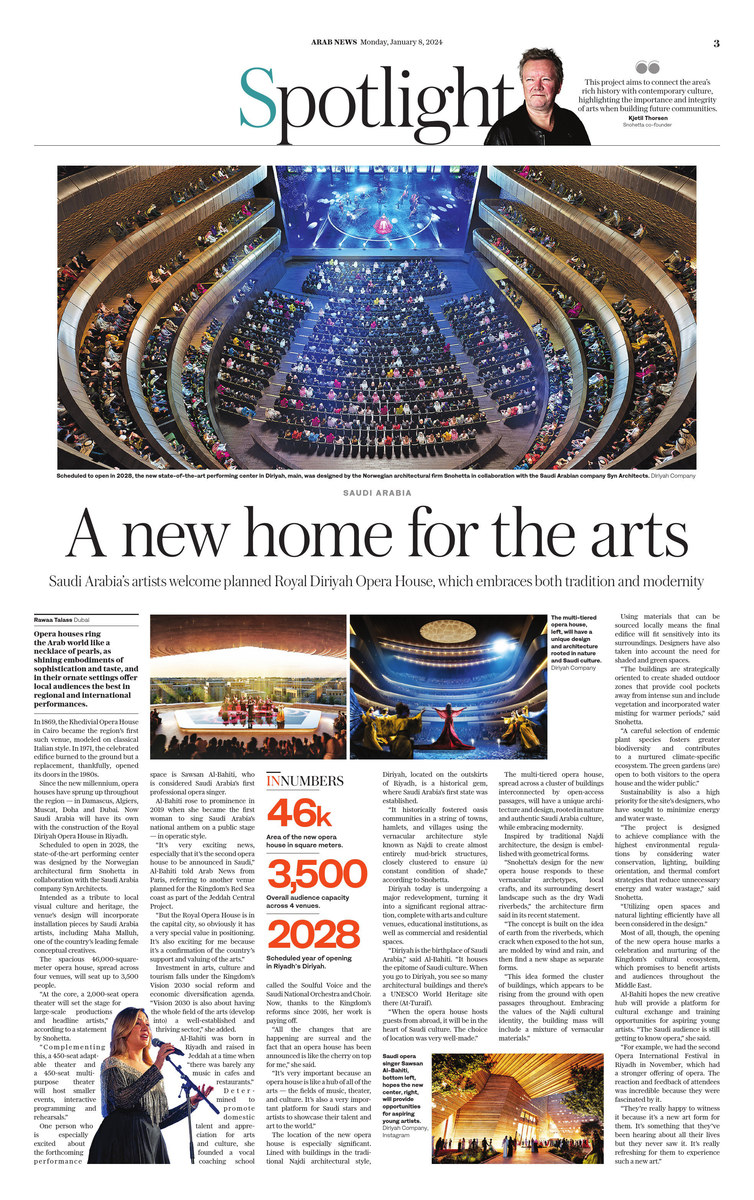DUBAI: Opera houses ring the Arab world like a necklace of pearls, as shining embodiments of sophistication and taste, and in their ornate settings offer local audiences the best in regional and international performances.
In 1869, the Khedivial Opera House in Cairo became the region’s first such venue, modeled on classical Italian style. In 1971, the celebrated edifice burned to the ground but a replacement, thankfully, opened its doors in the 1980s.
Since the new millennium, opera houses have sprung up throughout the region — in Damascus, Algiers, Muscat, Doha and Dubai. Now Saudi Arabia will have its own with the construction of the Royal Diriyah Opera House in Riyadh.
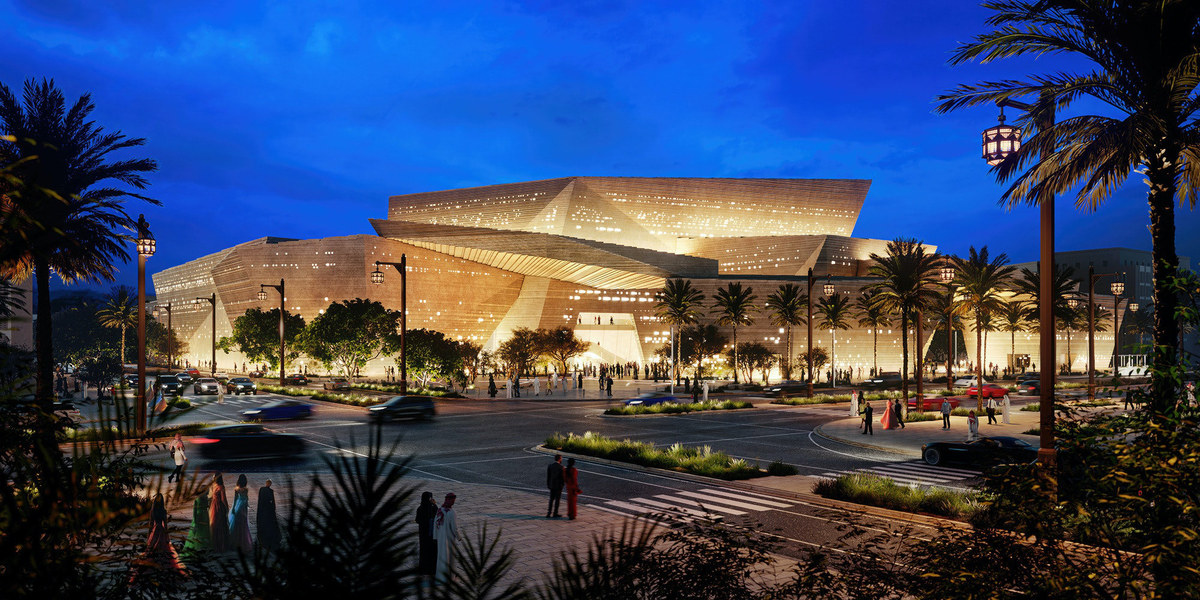
Set to open in 2028, the Royal Diriyah Opera House is envisioned to create a new stage for future generations of performers, audiences and cultural exchange. (Photo courtesy of snohetta.com)
Scheduled to open in 2028, the state-of-the-art performing center was designed by the Norwegian architectural firm Snohetta in collaboration with the Saudi Arabia company Syn Architects.
Intended as a tribute to local visual culture and heritage, the venue’s design will incorporate installation pieces by Saudi Arabia artists, including Maha Malluh, one of the country’s leading female conceptual creatives.
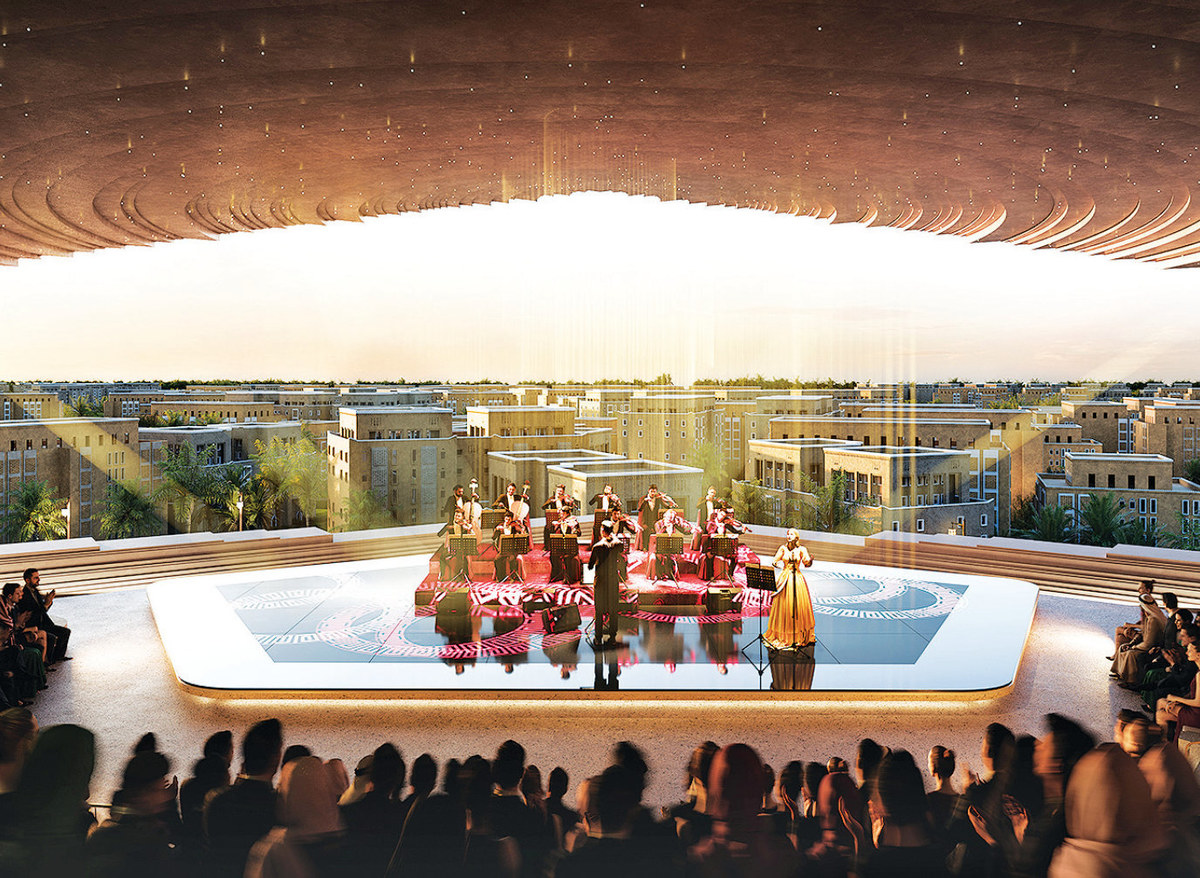
The multi-tiered opera house will have a unique design and architecture rooted in nature and Saudi culture. (Diriyah Company)
The spacious 46,000-square-meter opera house, spread across four venues, will seat up to 3,500 people.
“At the core, a 2,000-seat opera theater will set the stage for large-scale productions and headline artists,” according to a statement by Snohetta.
“Complementing this, a 450-seat adaptable theater and a 450-seat multipurpose theater will host smaller events, interactive programming and rehearsals.”
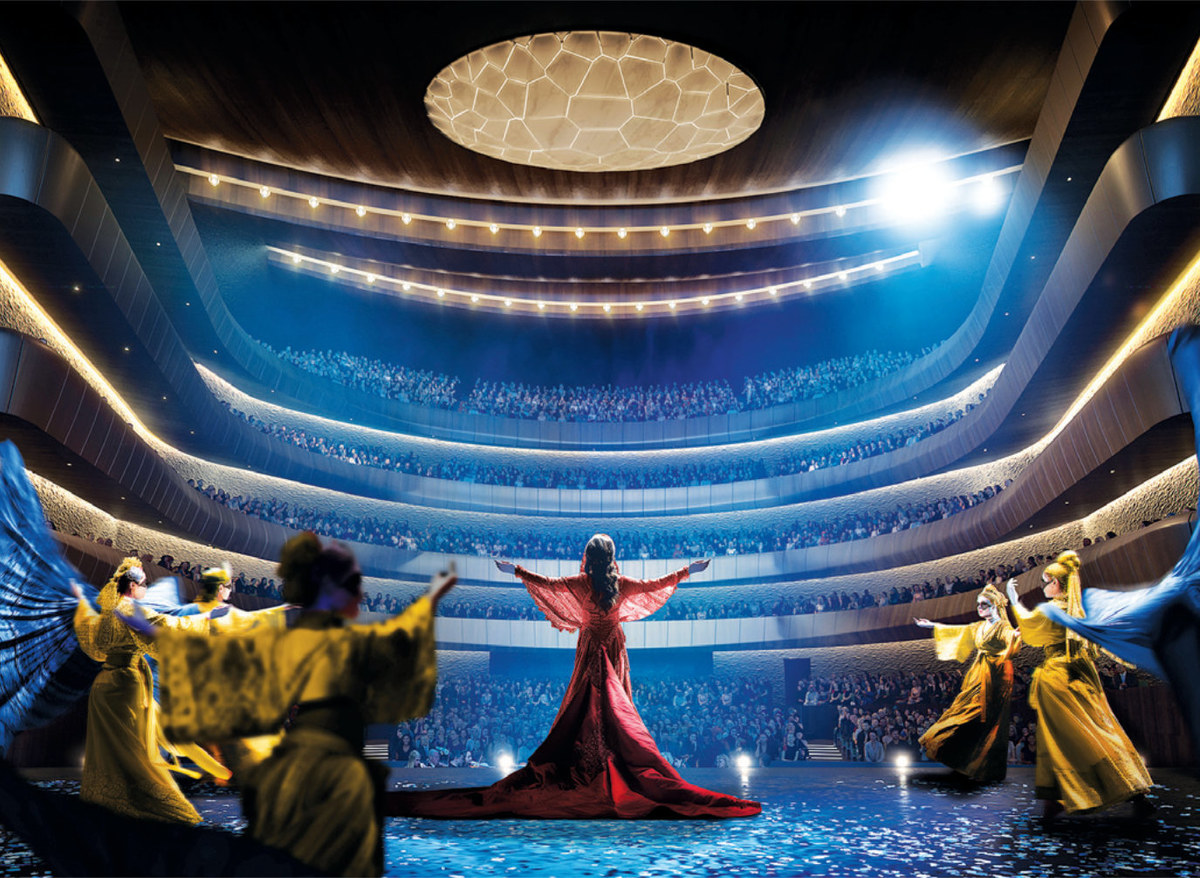
The multi-tiered opera house will have a unique design and architecture rooted in nature and Saudi culture. (Diriyah Company)
One person who is especially excited about the forthcoming performance space is Sawsan Al-Bahiti, who is considered Saudi Arabia’s first professional opera singer.
Al-Bahiti rose to prominence in 2019 when she became the first woman to sing Saudi Arabia’s national anthem on a public stage — in operatic style.
“It’s very exciting news, especially that it’s the second opera house to be announced in Saudi,” Al-Bahiti told Arab News from Paris, referring to another venue planned for the Kingdom’s Red Sea coast as part of the Jeddah Central Project.
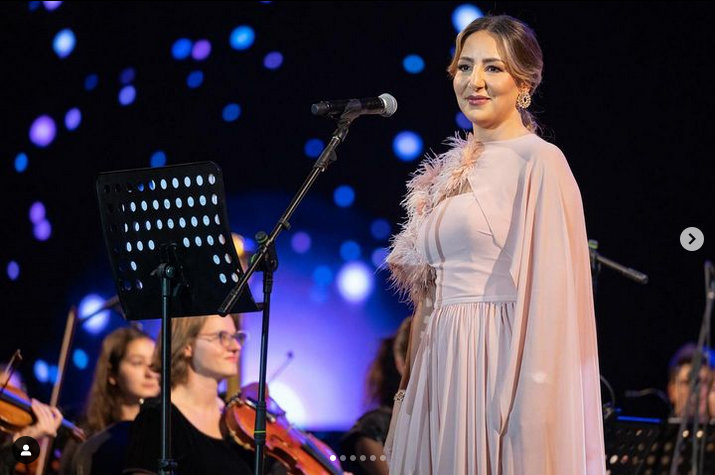
Sawsan Al-Bahiti, Saudi Arabia’s first professional opera singer. (Instagram)
“But the Royal Opera House is in the capital city, so obviously it has a very special value in positioning. It’s also exciting for me because it’s a confirmation of the country’s support and valuing of the arts.”
Investment in arts, culture and tourism falls under the Kingdom’s Vision 2030 social reform and economic diversification agenda. “Vision 2030 is also about having the whole field of the arts (develop into) a well-established and thriving sector,” she added.
Al-Bahiti was born in Riyadh and raised in Jeddah at a time when “there was barely any music in cafes and restaurants.”
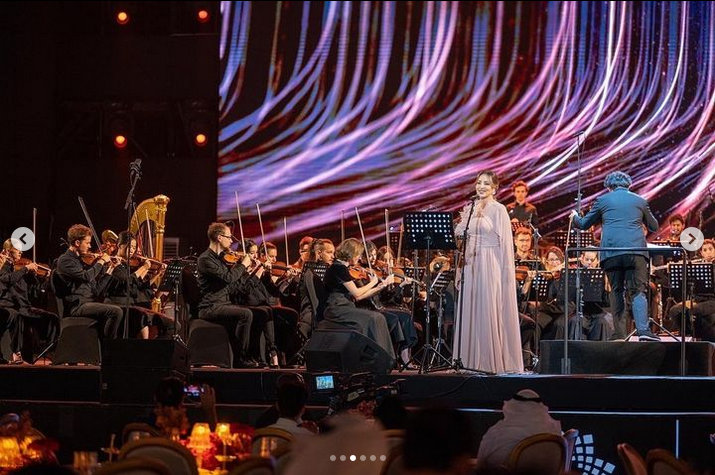
Sawsan Al-Bahiti became the first woman to sing Saudi Arabia’s national anthem on a public stage — in operatic style. (Instagram)
Determined to promote domestic talent and appreciation for arts and culture, she founded a vocal coaching school called the Soulful Voice and the Saudi National Orchestra and Choir. Now, thanks to the Kingdom’s reforms since 2016, her work is paying off.
“All the changes that are happening are surreal and the fact that an opera house has been announced is like the cherry on top for me,” she said.
“It’s very important because an opera house is like a hub of all of the arts — the fields of music, theater, and culture. It’s also a very important platform for Saudi stars and artists to showcase their talent and art to the world.”
The location of the new opera house is especially significant. Lined with buildings in the traditional Najdi architectural style, Diriyah, located on the outskirts of Riyadh, is a historical gem, where Saudi Arabia’s first state was established.
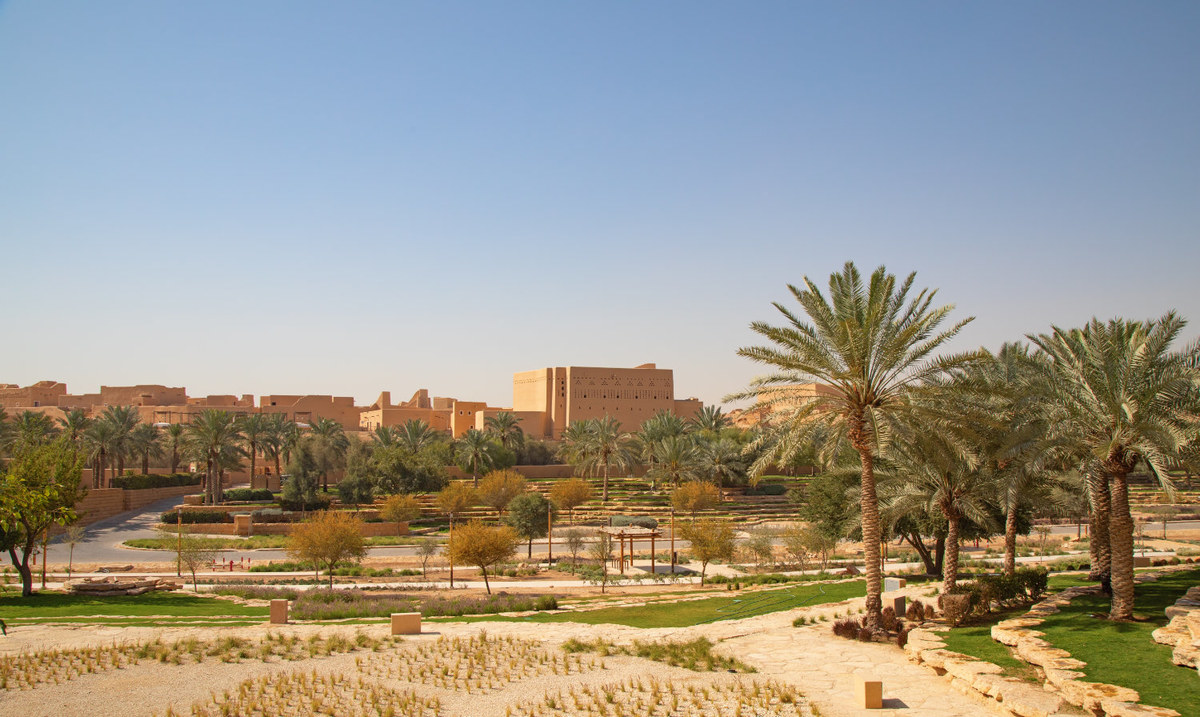
Diriyah, about 10 kilometers west of Kingdom Tower in Saudi Arabia’s modern capital, Riyadh, is now revered as the birthplace of the Kingdom. It was declared a UNESCO World Heritage Site in 2010. (Shutterstock)
“It historically fostered oasis communities in a string of towns, hamlets, and villages using the vernacular architecture style known as Najdi to create almost entirely mud-brick structures, closely clustered to ensure (a) constant condition of shade,” according to Snohetta.
Diriyah today is undergoing a major redevelopment, turning it into a significant regional attraction, complete with arts and culture venues, educational institutions, as well as commercial and residential spaces.
“Diriyah is the birthplace of Saudi Arabia,” said Al-Bahiti. “It houses the epitome of Saudi culture. When you go to Diriyah, you see so many architectural buildings and there’s a UNESCO World Heritage site there (At-Turaif).
“When the opera house hosts guests from abroad, it will be in the heart of Saudi culture. The choice of location was very well-made.”
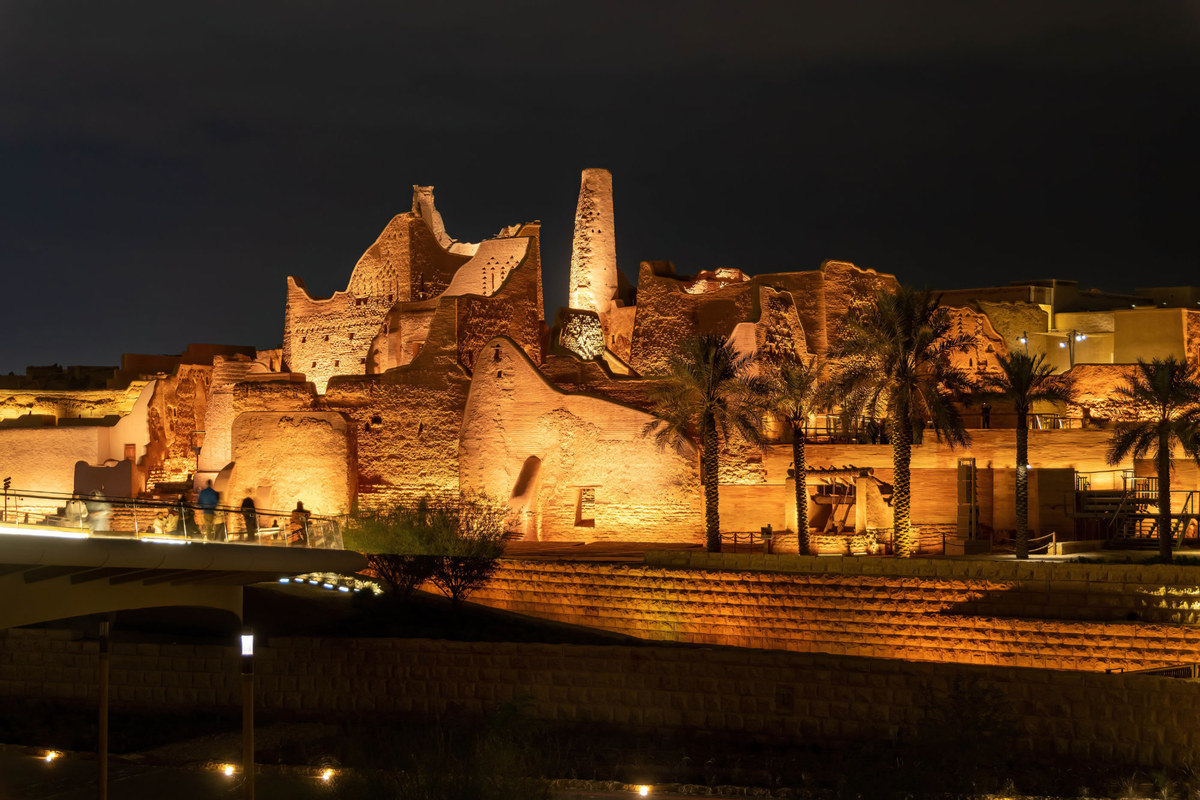
A night view of the reconstructed ruins of Diriyah. (Shutterstock)
The multi-tiered opera house, spread across a cluster of buildings interconnected by open-access passages, will have a unique architecture and design, rooted in nature and authentic Saudi Arabia culture, while embracing modernity.
Inspired by traditional Najdi architecture, the design is embellished with geometrical forms. The exterior walls feature square and rectangular openings, emitting bright light from within and welcoming natural light into its interior.
“Snohetta’s design for the new opera house responds to these vernacular archetypes, local crafts, and its surrounding desert landscape such as the dry Wadi riverbeds,” the architecture firm said in its recent statement.
INNUMBERS
46,000 Area of the new opera house in square meters.
3,500 Overall audience capacity across 4 venues.
2028 Scheduled year of opening in Riyadh’s Diriyah.
“The concept is built on the idea of earth from the riverbeds, which crack when exposed to the hot sun, are molded by wind and rain, and then find a new shape as separate forms.
“This idea formed the cluster of buildings, which appears to be rising from the ground with open passages throughout. Embracing the values of the Najdi cultural identity, the building mass will include a mixture of vernacular materials.”
Using materials that can be sourced locally means the final edifice will fit sensitively into its surroundings. Designers have also taken into account the need for shaded and green spaces.
“The buildings are strategically oriented to create shaded outdoor zones that provide cool pockets away from intense sun and include vegetation and incorporated water misting for warmer periods,” said Snohetta.
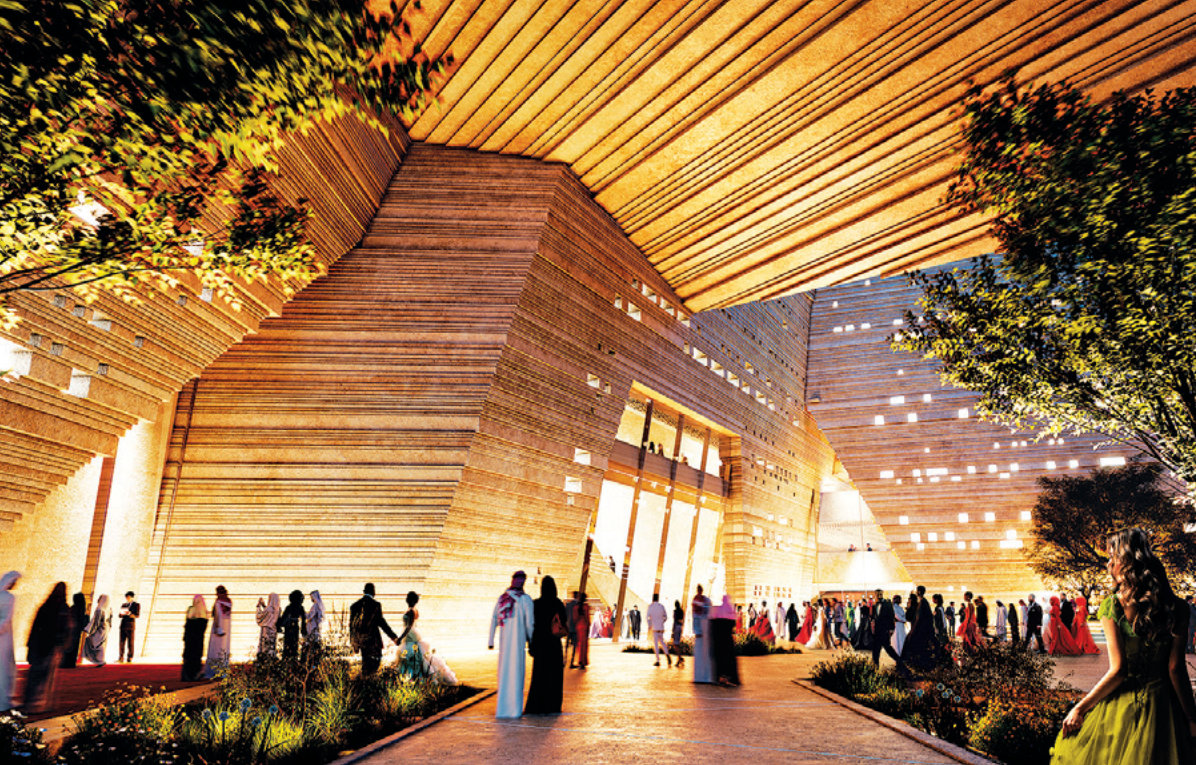
Using materials that can be sourced locally means the final edifice will fit sensitively into its surroundings. (Diriyah Company photo)
“A careful selection of endemic plant species fosters greater biodiversity and contributes to a nurtured climate-specific ecosystem. The green gardens (are) open to both visitors to the opera house and the wider public.
“Seamlessly integrating these public spaces enriches both the cultural and recreational experiences and enhances the intrinsic value of the location.”
Sustainability is also a high priority for the site’s designers, who have sought to minimize energy and water waste.
“The project is designed to achieve compliance with the highest environmental regulations by considering water conservation, lighting, building orientation, and thermal comfort strategies that reduce unnecessary energy and water wastage,” said Snohetta.
“Utilizing open spaces and natural lighting efficiently have all been considered in the design.”

A night view of Diriyah. (Shutterstock)
Most of all, though, the opening of the new opera house marks a celebration and nurturing of the Kingdom’s cultural ecosystem, which promises to benefit artists and audiences throughout the Middle East.
Al-Bahiti hopes the new creative hub will provide a platform for cultural exchange and training opportunities for aspiring young artists. “The Saudi audience is still getting to know opera,” she said.
“For example, we had the second Opera International Festival in Riyadh in November, which had a stronger offering of opera. The reaction and feedback of attendees was incredible because they were fascinated by it.
“They’re really happy to witness it because it’s a new art form for them. It’s something that they’ve been hearing about all their lives but they never saw it. It’s really refreshing for them to experience such a new art.”
